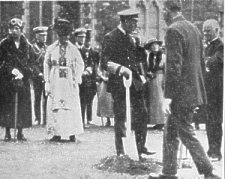
[From IoM Examiner Annual 1921]

His Majesty Planting a Tree at Bishopscourt.
During the visit of their Majesties the King and Queen to the Island in July last, the Royal party spent a few minutes at the historic residence of the Bishops of Sodor and Man, and were welcomed by the present occupant of the See, Dr. Denton Tbompson. Their Majesties and Princess Mary, with their suite, were shown around the residence and the Cathedral, and subsequently the King and Queen each planted an oak-tree in the grounds, Princess Mary planting a palm-tree in between. The photograph reproduced above was taken just prior to the tree-planting ceremony.
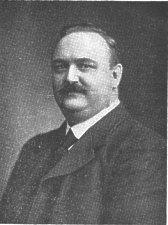
(Councillor Thomas Gilbert Kelly, J.P.) Councillor Thomas Gilbert Kelly, who was on November 9th last elected Mayor of Douglas, was not born in the Isle of Man, as he first saw the light of day at Bolton; but he is of Manx birth, being a son of the late Mr John J. Kelly builder, of Douglas. He served his time to his father's trade, and when barely past his majority he came to Douglas to take charge of the business of his cousin, Mr W. Kelly, on the Bridge, Douglas. Subsequently he went into the licensed victualling trade, and he has for many years occupied The Bridge Inn, on the North-quay. He has for twenty-one years been secretary of the Isle of Man Licensed Victuallers' Association. He was elected to the Town Council in 1910, and has been chairman of four of the Council's standing committees. Mr Kelly took a leading part in forming the Isle of Man Football Association, and is a former secretary of that body and also of the Rugby Union. Another direction in which Mr Kelly prides himself as having been a pioneer is the trades union movement in the Island. He was active in the formation of the Douglas branch of the Amalgamated Society of Carpenters and Joiners.
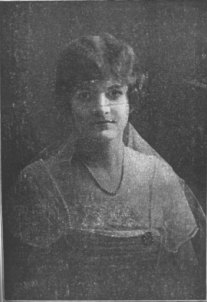
who is to sing at the Manx Festival in April, is called " The Queen of Song" and " The Girl with the Golden Voice." We prefer " The Nightingale of the North." Never before have liquid tones been heard that so rivalled the bird on the bough fretting out his soul in the silvery light of a summer night. Yet "this slip of a girl" is only 23, and the final bloom is yet to come to a voice that is even to-day excelled by none in the wide world. Singing, apparently, is as easy and as natural to Flora Woodman as stirring porridge is to a girl in a farm kitchen. And the parallel does not end there-she is as sweet, as gentle, as whole-hearted, and as unspoiled.
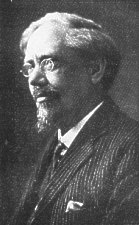
inherited from his Manx father [he was brother of Thomas Hall Caine] and English mother sterling gifts-sincerity, humour, and plain common-sense. These are first-class assets to a man trained in the use of the press and devoted to the dissemination of his ideas. Without occupying any public office, probably no one has utilised the newspapers to such a degree and exercised so subtle an influence on the public mind. During the past ten years a never-ending stream of articles have appeared-a thousand columns at least-. In the years to come he will be remembered for clarity of vision, for broad-mindedness and passionate devotion to education in its highest sense, of which his ' Annals of the Magic Isle" is the best example. He is a Fellow of the Sociëte de Philologie, and an Honorary Life Member of the Lancashire Authors' Association, the latter in recognition of his historical survey, The Challenge of Lancashire." [ Photo. by Warburton.]
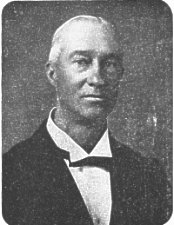
Few Manxmen have been so widely and unreservedly esteemed as Mr John Hattersley Clarke, of " Brynwood," Douglas, who passed away on April 24th last, having just completed his 52nd year. Mr Clarke was the son of the late Mr W. Clarke, of Douglas, and he and his father between them held for fifty years the local agency for the Norwich Fire and Life Union, and also represented several other famous trading concerns. He was business man for numerous private individuals and families, and for some time he discharged the duties of secretary to the H. B. Noble Trust. He was unquestionably the most popular Methodist local preacher in the Isle of Man; he was a Sunday-school superintendent, a class leader, and an office-holder in a great variety of ways. He interested himself actively in many charitable organisations, and his kindliness in his private capacity became almost a legend. He was often urged to accept public office, but he never did so except that from 1892 to 1899 he sat on the Douglas School Board. During the war he interested himself in the Australian Forces, and when Mr Copeland Smith started the Manx Industries, became chairman of the company.
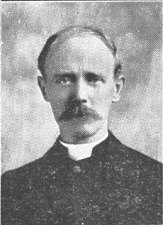
Minister of St. Andrew's Presbyterian Church of England, Douglas. The Rev. P. Campbell, who was inducted at St. Andrew's Church on July 28th, 1920, was in his boyhood a Foundation Scholar of King Edward's High School, Birmingham, where he gained in succession the Junior and Senior King Edward Scholarships and a leaving Exhibition of £200. Proceeding to Edinburgh University he was awarded an Open University Bursary, and during his course won various medals and prizes, including a Gray Essay Prize. In 1892 he graduated M.A. with honours in Classics. From 1892-1895 he attended the Theological College of the Presbyterian Church of England then in London, where, in addition to the first College Scholarship of each year, he gained in 1893 the Dr. Williams-Divinity Scholarship of £100, open to all graduates attending Nonconformist Colleges in England. After leaving College he became assistant to the Rev. A. N. Mackray, M.A., of St. George's, Croydon. In 1897 he took his B.D. degree at Edinburgh, and at the close of the same year was ordained and inducted to the pastoral charge of Durham Presbyterian Church. In 1911, after a ministry of 13 years, he accepted a call to Grimsby. In 1916 he was translated to Trinity Church, Doncaster, whence he was invited to St. Andrew's, Douglas. In all the towns in which he has ministered he has taken an active interest in public life, and has been in much demand as a lecturer on musical and literary subjects especially Scottish.
|
|
||
|
|
||
|
Any comments, errors or omissions gratefully received
The Editor |
||